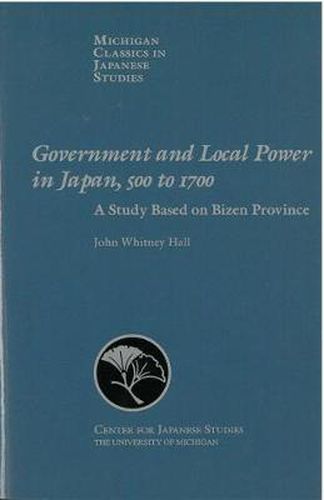Readings Newsletter
Become a Readings Member to make your shopping experience even easier.
Sign in or sign up for free!
You’re not far away from qualifying for FREE standard shipping within Australia
You’ve qualified for FREE standard shipping within Australia
The cart is loading…






This important study of Japan in premodern times, embracing a span of nearly thirteen centuries, is directed toward the illumination of some important elements of continuity in Japanese history. It is an effort to explain through the detailed analysis of a microcosm–the small province of Bizen–the fundamental institutions of political organization and social and economic structure upon which Japanese government has rested. It seeks historical depth both by limiting the study in terms of its geographical scope and by restricting the number of variables to which it gives attention. This book deals chiefly with the combination of traditions and techniques by which the Japanese organized power and exercised authority and the connections between the holders of power and the sources of wealth, mainly land. Thus, Government and Local Power in Japan deals with such subjects as theories of legitimacy and practices of administration, concepts of social stratification and social rights, and practices of land tenure and taxation. It seeks to gain a sufficient intimacy with Japanese life to find meaning in the historic continuities and changes in the way premodern Japanese governed themselves.
$9.00 standard shipping within Australia
FREE standard shipping within Australia for orders over $100.00
Express & International shipping calculated at checkout
Stock availability can be subject to change without notice. We recommend calling the shop or contacting our online team to check availability of low stock items. Please see our Shopping Online page for more details.
This important study of Japan in premodern times, embracing a span of nearly thirteen centuries, is directed toward the illumination of some important elements of continuity in Japanese history. It is an effort to explain through the detailed analysis of a microcosm–the small province of Bizen–the fundamental institutions of political organization and social and economic structure upon which Japanese government has rested. It seeks historical depth both by limiting the study in terms of its geographical scope and by restricting the number of variables to which it gives attention. This book deals chiefly with the combination of traditions and techniques by which the Japanese organized power and exercised authority and the connections between the holders of power and the sources of wealth, mainly land. Thus, Government and Local Power in Japan deals with such subjects as theories of legitimacy and practices of administration, concepts of social stratification and social rights, and practices of land tenure and taxation. It seeks to gain a sufficient intimacy with Japanese life to find meaning in the historic continuities and changes in the way premodern Japanese governed themselves.